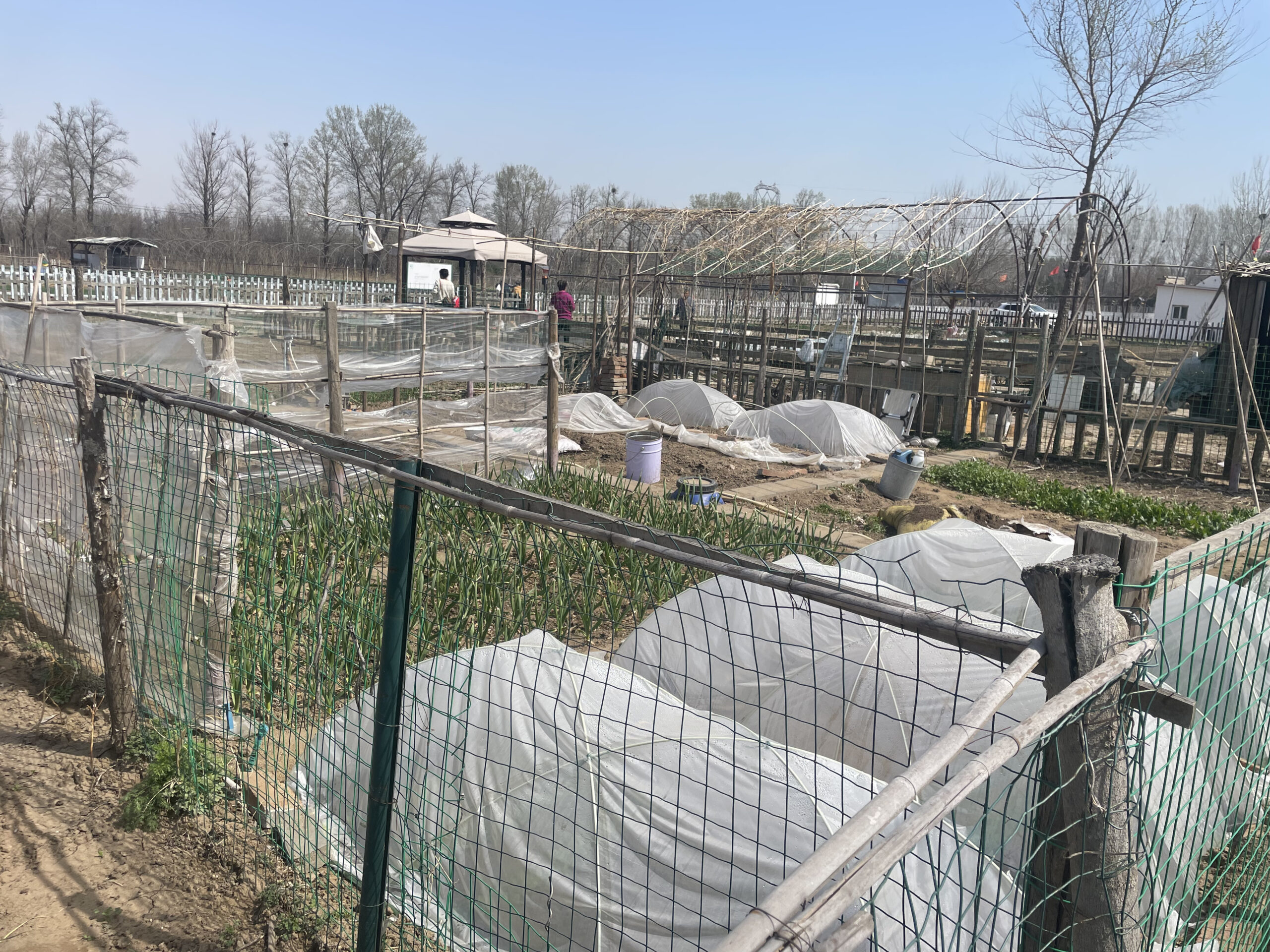In March, while UK farmers were protesting at Westminster, demanding that they receive a fair price for their food, I was travelling in China in an attempt to understand the country the US is targeting for war.
Of course, I couldn’t resist visiting an organic farm to film another episode in our Wise Farmer series of short videos about inspired farmers. The Little Donkey Farm, a small-scale fruit and veg farm near Beijing, is free from both chemical pesticides and fertilisers and genetically manipulated seeds and is co-funded by the Chinese government. The farm delivers boxes of natural fruit and veg to urban customers, as well as providing small allotments for urban families to grow food for their own consumption. The families receive guidance about food growing and a chance to escape their tiny high-rise homes and hard working lives in a concrete, metal and tarmac urban jungle.
Unlike in China, in the UK, food sovereignty is not a priority. Just to quote one farming sector, 49% of fruit and veg farmers in the UK fear that they are likely to go out of business in the next 12 months. In China, the government’s Rural Revitalisation Programme and food security policy gives subsidies to farmers to grow food, unlike in the U.K. where most subsidies go to NetZero programmes, like planting trees and growing bird seed, that for some obscure reason trump growing food! To improve the quantity and quality of land available for growing food, the Chinese government gives the farmers subsidies to reclaim land formerly used for manufacturing, while our government gives planning permission to cover our precious food growing land in solar panels as opposed to on roofs. To promote organic farming, the Chinese Government also subsidises organic fertilisers to help grow the sector, whereas I have received zero subsidies for my chemical free fruit and veg market garden, Forbidden Fruit and Veg.
The Chinese want to increase home grown food and improve the quality, while the globalists in the UK government sign free trade agreements that allow cheap, substandard food imports to undermine our farmers and perpetuate a race to the bottom in food quality and undermine our food security. The ultimate goal is to syphon all the profits from our skilled independent farmers into Big Ag coffers.
Under the veil of abating climate change, transnational corporations are driving the world to modernise agriculture with Agri- tech factories run by scientists using GMO seed, chemical pesticides and fertilisers, AI, robots and drones.
In China I visited one such Agri-tech centre where, in massive greenhouses, plants where scientists, instead of farmers, grow all year round tomatoes and strawberries in imported bags of peat, spray with pesticides and drip fed with chemical fertiliser and water. The guide asked why suddenly so many foreigners were visiting. I suggested it was to steal their Agri-tech ideas and couldn’t help thinking that it was to grow the next generation of Frankenstein food.
For more information about how China’s President Xi Jinping has urged ‘rural vitalization’ and declared a commitment to renewing peasants’ rights of land use for 30 more years’, read ‘From Sannong to Rural Vitalization’ paragraph in;
In Transition to Rural Vitalization: China’s Strategy amid the Global Crises; Erebus Wong, Sit Tsui and Wen Tiejun; Dec 2024
Abstract;
‘This article examines how China deals with the global crises. China’s policies to counter the crises rely on maintaining investment-led growth, which, however, has incurred an overexpansion of credits and serious debts similar to those of the West entering the era of financial capitalism. The current challenge is whether China can deploy the strategy of rural vitalization to turn to ecological civilization.’
‘The majority, 60% of the population, are small property owners in rural areas. This is not only the legacy of land revolution, but also the foundation of Chinese society, which acts as social stabiliser during economic crises.’
‘Previously peasants were happy to give up their rural household registration to become urban households. Now, the situation has in some ways reversed, as many urban households have returned to their home villages asking to be given back their peasant identity and rural household registration.’
‘In short, the current moves on the economic front constitute China’s proactive effort to steer away from decades of developmentalism in line with the Western model of modernization. ‘Beautiful villages’ are conceived to be the carrier of ‘beautiful China’. The national development strategy is gradually adjusted toward inclusive sustainable development which is resource-efficient and eco-friendly.’
Share This Article
Related ArticlesView All
Wise Farmers: Will Hall
Will Hall, 34, started farming about eight years ago while halfway through doing a PhD at the University of Bristol… Read More
Wise Farmers: Gerald Miles
Gerald Miles is a seventh-generation farmer on the Pembrokeshire coast in West Wales, where he farms organically 120 acres of… Read More
Wise Farmers: Ben Andrews
Ben Andrews and his father Colin run an organic farm at Broadward Hall in Herefordshire near the border with Wales…. Read More
Borneo Villagers Battle For Freedom – Sarawak
Join us on a journey to Nyegol village in Sarawak, Malaysia, where the Bidayuh community has rebuilt their homes high… Read More
Wise Farmers: Nicolette Niman
After graduating from Kalamazoo College in Michigan with a Bachelor’s Degree in Biology and French, Nicolette Hahn Niman attended the… Read More
Wise Farmers: Benj Wilson
Benj grew up in rural Gloucestershire, where his father David was the manager of King Charles’ organic farm at Highgrove…. Read More






